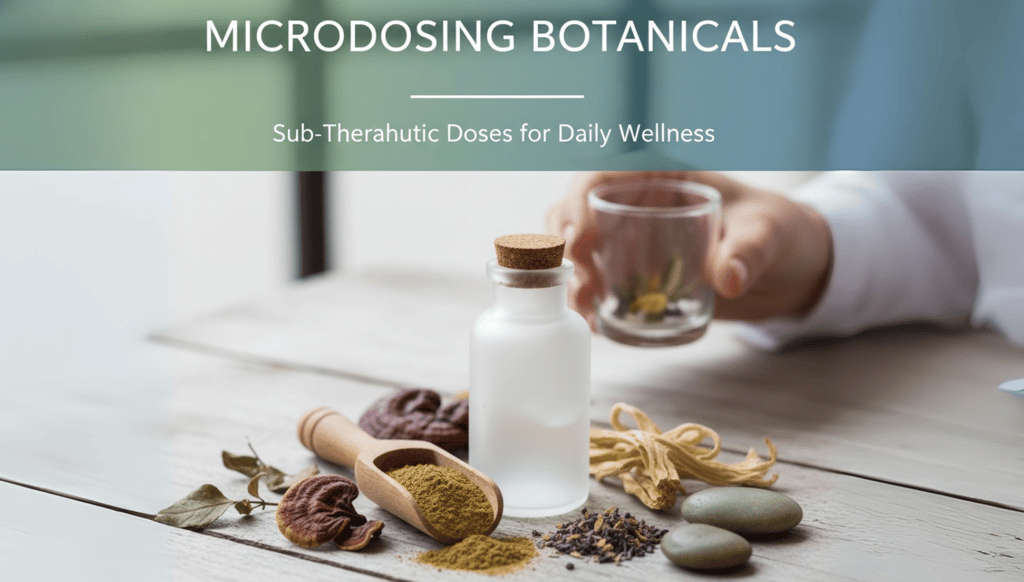Microdosing Botanicals: Sub-Therapeutic Doses for Daily Wellness
4 min read


Understanding Microdosing Botanicals
Microdosing botanicals refers to the practice of consuming sub-therapeutic doses of herbal extracts, thereby optimizing wellness without the risk of side effects that can be associated with higher dosages. This approach utilizes lower quantities of plants, herbs, or fungi, allowing individuals to experience the potential benefits while minimizing the intensity commonly associated with conventional dosing methods.
Historically, microdosing has roots in various cultures that have utilized plant medicine for centuries. Ancient civilizations often incorporated plants into their daily routines, albeit without the precise dosages we recognize today. In recent years, the concept of microdosing has gained traction, especially in the fields of herbalism and psychopharmacology, with advocates claiming a variety of benefits ranging from enhanced mood to improved cognitive function. This resurgence of interest in natural health solutions has contributed to the growing acceptance of microdosing in contemporary society.
In North America, this practice has resonated significantly with a diverse demographic, particularly among millennials and health-conscious individuals looking for alternative wellness strategies. They often seek holistic methods to enhance mental clarity and emotional stability, steering towards practices that align with their values of sustainability and natural living. The increase in resources including books, online forums, and workshops dedicated to microdosing has further catalyzed its popularity, establishing community support around this growing movement.
Microdosing botanicals stands apart from traditional approaches primarily due to its emphasis on lower doses intended for daily use. While conventional herbal dosing may be concentrated and aimed at treating specific health conditions, microdosing aligns with the notion of preventive wellness, potentially offering individuals a way to maintain balance and wellbeing in their everyday lives. This shift toward embracing lower doses reflects an underlying acknowledgment of the potency that can exist within nature’s offerings, creating a promising landscape for future explorations in daily wellness.
Potential Benefits of Microdosing Botanicals
Microdosing botanicals, which includes the practice of consuming herbal extracts in sub-therapeutic doses, has gained popularity in recent years as individuals seek natural solutions for various health and wellness concerns. Notably, adaptogens, CBD, and turmeric have emerged as frontrunners in this domain, each offering distinct benefits that contribute to overall well-being.
Adaptogens, for instance, are compounds that help the body resist stressors of various kinds. Studies have indicated that microdosing adaptogenic herbs like Rhodiola and Ashwagandha can enhance mental clarity and focus while reducing fatigue and anxiety levels. Research published in the Journal of Ethnopharmacology has noted significant improvements in mood and cognitive performance among those who incorporated these herbs into their daily routine.
Another popular botanical, CBD (cannabidiol), is celebrated for its potential in stress reduction and anxiety alleviation. Anecdotal evidence, alongside clinical studies, suggests that microdosing CBD can lead to sustained emotional balance and relaxation without the psychoactive effects associated with its counterpart, THC. A study in the Frontiers in Psychology highlighted that participants reported decreased anxiety levels following regular CBD intake, showcasing its utility as a daily wellness aid.
Turmeric, known for its active ingredient curcumin, brings anti-inflammatory properties to the forefront. By microdosing turmeric, individuals may experience reduced inflammation and improved joint health. A comprehensive review in the Journal of Natural Products examined curcumin's role in alleviating symptoms linked to inflammatory conditions, suggesting that daily microdoses could promote physical wellness.
This growing interest in microdosing botanicals reflects a larger consumer trend toward embracing natural wellness solutions as safe, effective alternatives to conventional therapies. As individuals increasingly prioritize holistic approaches, the potential benefits of microdosing these herbal extracts will continue to gain recognition.
Safety Considerations and Best Practices
Microdosing botanicals has gained popularity as a method for individuals seeking to enhance their daily wellness. However, navigating the safety considerations associated with this practice is paramount. First and foremost, sourcing high-quality botanical products is essential. Utilizing products from reputable suppliers, such as Solnutra, ensures that consumers receive substances manufactured in accordance with Canadian Good Manufacturing Practices (GMP). This not only guarantees the quality of the botanical extracts but also their purity and potency, thereby reducing the risk of contaminants that could jeopardize user health.
Another critical aspect of microdosing safely involves understanding proper dosing protocols. Users should begin with conservative amounts and gradually adjust based on their individual responses. This incremental approach is beneficial for identifying the minimum effective dose while minimizing potential side effects. Additionally, keeping a detailed journal can aid individuals in tracking their experiences and any physiological changes, thereby enhancing the personalized nature of this wellness strategy.
Transparency within the herbal supplement industry cannot be overlooked. The importance of third-party testing serves as a valuable measure for ensuring the safety and efficacy of botanical products. Vendors who provide test results not only affirm the quality of their offerings but also bolster consumer confidence. Being able to verify that a product is free from harmful substances, such as heavy metals and pesticides, can reassure customers regarding the safety of their microdosing practices.
In conclusion, microdosing botanicals can be a beneficial wellness strategy when approached with care and informed decision-making. By prioritizing high-quality sourcing, adherence to diligent dosing practices, and transparency through third-party testing, individuals can optimize their experience while minimizing associated risks.
Practical Dosing Examples and Call to Action
When considering the practice of microdosing botanicals, it is essential to understand standardized dosing recommendations for popular herbs such as adaptogens, CBD, and turmeric. These guidelines not only help in maximizing the health benefits but also ensure safety and efficacy.
For adaptogens, a common choice is Ashwagandha, which is often recommended at a dosage of 300 to 600 mg per day. This range has been shown to assist in stress reduction and support overall well-being. Similarly, Rhodiola Rosea is frequently dosed between 200 to 400 mg each day, with studies indicating improved energy levels and cognitive function. It is vital to start at the lower end of these recommendations and adjust as necessary based on individual reactions and needs.
When it comes to CBD, effective microdosing typically ranges from 5 to 20 mg per serving. Many individuals find that beginning with a low dose and gradually increasing is beneficial to determine their optimal intake. CBD's effects on anxiety, sleep, and general wellness make it a versatile option in the realm of microdosing.
Turmeric, known for its anti-inflammatory properties, is often consumed in dosages ranging from 500 to 1,000 mg per day, particularly in the form of standardized extracts that include curcumin, its active component. Incorporating black pepper extract can enhance absorption, thereby making microdosing even more effective.
At Solnutra, we embrace a precision dosing approach, which ensures that our customers receive accurate, effective, and safe botanical doses tailored for daily wellness. We invite potential partners to explore collaboration opportunities, whether for product development or private labeling. Together, we can leverage the well-documented benefits of microdosing to create wellness solutions that resonate on a wider scale. For those interested in harnessing the power of botanicals through innovative practices, reaching out to us could be the first step in a fruitful partnership.
